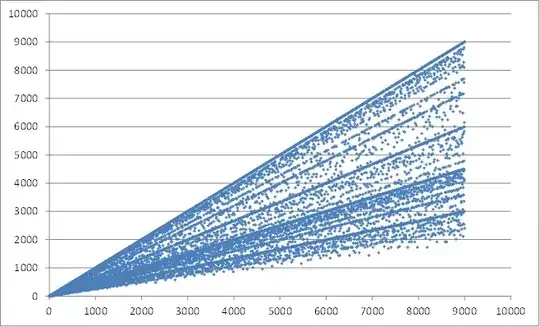Are there finitely or infinitely many integers n for which $φ(n) = 1000$? I think that there are finite, but I don't know how to prove it.
-
See my answer here: http://math.stackexchange.com/questions/912137/is-there-an-integer-n0-such-that-varphin-n-has-infinitely-many-solutio/912139#912139 – tc1729 May 14 '15 at 23:39
-
@SiddharthPrasad Can you provide an answer here? – Sandi kae May 14 '15 at 23:44
-
1I'm not completely certain what the proper etiquette here is, but I think that it is more appropriate that this be marked a duplicate rather than me replicating my answer here verbatim (?) – tc1729 May 14 '15 at 23:46
-
1@SiddharthPrasad Indeed, this should be closed as a duplicate question. – A.P. May 14 '15 at 23:59
-
1I don't get it. If $\varphi(n)=1000$ then $n$ is a product of distinct prime powers of the form $p^k$ where $\varphi(p^k)|1000,$ and there are only a finite number of those: $2,4,8,16,5,25,125,625,3,11,41,101,251,$ I think that's all. In other words, $n$ is a divisor of $2^4\cdot5^4\cdot3\cdot11\cdot41\cdot101\cdot251$ unless I've missed something. – bof May 15 '15 at 05:28
-
@bof Every answer here is saying that $\phi(n) = 1000$ has at most finitely many solutions. What is it that you don't understand? – A.P. May 15 '15 at 17:49
-
@A.P. I don't understand why the O.P. would think it could have an infinite number of solutions. – bof May 15 '15 at 22:32
-
@bof Indeed, he wrote that he thought it had only finitely many solutions, but that he didn't have a proof. – A.P. May 15 '15 at 23:24
3 Answers
Finitely many - $11$ in fact - the largest of which is $3750$. Here they all are:
$$\{1111,1255,1375,1875,2008,2222,2500,2510,2750,3012,3750\}$$
Taking $r = \dfrac{\phi(x)}{x}$, we know that $r = \prod \frac{p_i-1}{p_i}$ for each distinct prime power $p_i$ of $x$. So a new minimum $r$ is achieved for each primorial $x$, and the step up to the next primorial is far larger than the reduction of the ratio - $x$ will increase by a factor of $p_{n+1}$ (eg. say $13$) while minimum $r$ stays constant then only decreases by $\frac{p_{n+1}-1}{p_{n+1}}$ (say $\frac {12}{13}$) at that new primorial.
Looking at the $1000$ region, minimum $r$ is $\frac {1\times 2 \times 4 \times 6 \times 10}{2\times 3 \times 5 \times 7 \times 11} \approx 0.2078 $ (achieved at $2310$) so we definitely do not need to search past $x=\frac{1000}{0.2078}<5000$ for values where $\phi(x)=1000$. Just as a simple limiting argument.
Here's values of $\phi(x)$ up to $9000$ for illustrative purposes:

- 39,627
-
-
1@Joffan This still feels a bit heuristic to me. Can you explain why "the step up to the next primorial is far larger than the reduction of the ratio" (or provide a reference)? – A.P. May 14 '15 at 23:21
As Eric Naslund proved in this answer
For all $n\geq 3$ we have $$\phi(n)\geq \frac{n}{e^{\gamma}\log \log n}+O\left(\frac{n}{(\log \log n)^2}\right),$$ where $\gamma$ is the Euler-Mascheroni constant, and the above holds with equality infinitely often.
Further, observe that $n / \log \log n$ is increasing for every $n \geq 6$. In particular, we can find constants $N,c > 0$ such that $$ \phi(n) \geq \frac{n}{e^{\gamma}\log \log n} - c \, \frac{n}{(\log \log n)^2} > 1000 $$ for every $n \geq N$.
This, in turn, implies that the positive integers $n$ for which $\phi(n) \leq 1000$ is bounded above by $N$, so there can only be finitely many of those.
For all $p \ge 3$, $1-\tfrac1p \ge p^{-1/2}$ so $\phi(p^r) > \sqrt{p^r}$. Therefore $\phi(n) \ge \sqrt{n}$ for odd $n$, and accounting for even $n$, $\phi(n) \ge \tfrac12 \sqrt{n}$. This easily gives $\phi(n) > 1000$ for all $n > 4000000$.
- 25,198
- 3
- 37
- 91
-
-
1@Sandikae, note that $\phi(mn) = \phi(m)\phi(n)$ whenever $m,n$ are coprime and that $\phi(p^k) = p^k (1 - 1/p)$. Thus $1 - 1/p \geq 1/\sqrt{p} \geq 1/\sqrt{p^k}$ implies that $\phi(p^k) \geq p^k / \sqrt{p^k} = \sqrt{p^k}$. The case $p = 2$ is settled because $\phi(2m) = 2\phi(m)$ if $m$ is even and $\phi(2m) = \phi(m)$ if $m$ is odd. Anyway, you shouldn't accept an answer that you don't understand... – A.P. May 14 '15 at 23:56
-
@A.P. Wouldn't that be a reason to use the stronger $\sqrt{n/2}$ rather than the weaker $\sqrt{n}/4$? – Erick Wong May 15 '15 at 03:07
-
@ErickWong I'm sorry, I got confused. If $n = 2m$ with $m$ odd have $\phi(n) = \phi(\frac{n}{2}) \geq \sqrt{\frac{n}{2}} = \frac{\sqrt{2}}{2} \sqrt{n} \geq \sqrt{n}/2$, so it does work indeed. – A.P. May 15 '15 at 11:04
-
Anyway... in the future, please try to write out as many details as reasonable. Such a sketchy answer is more fit to be a comment. – A.P. May 15 '15 at 11:06